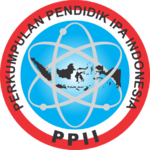INCREASING CREATIVE THINKING SKILLS AND UNDERSTANDING OF PHYSICS CONCEPTS THROUGH APPLICATION OF STEM-BASED INQUIRY
DOI:
https://doi.org/10.26740/jppipa.v4n1.p25-30Keywords:
guided inquiry, STEM, creative thinking skills, conceptual understandingAbstract
This research aimed to improve students physics creative thinking skills and conceptual understanding of grade 7 of Islamic Junior High School (MTs) Sunan Ampel Nganjuk. This research implemented Classroom Action Research (CAR) with one cycle of two meetings. Each cycle included the stages of planning, implementation, observation, and reflection. The subjects of this study were 17 students of grade 7 of MTs Sunan Ampel Nganjuk First Semester Academic Year 2016/2017. The instruments of data collection in this study were in the form of essay tests (pre-test and post-test) to measure students' creative thinking skills. The results showed the average value of the creative thinking skills of the first cycle and the second cycle which were expressed by the average of N-Gain experienced an increase with the acquisition in the first cycle of 0.6 which was categorized as moderate and increased in the second cycle of 0.7 which was categorized as moderate. In cycle I the highest indicator of creative thinking was fluency, which is equal to 0.76 and the lowest indicator of creative thinking was originality with an N-gain value of 0.34, as well as in the cycle II The highest indicator of creative thinking was the fluency thinking skills which is equal to 0.81 and the lowest creative thinking indicator was the originality with an N-gain value of 0.48. The average value of physics conceptual understanding in the first and second cycles expressed by the average of N-Gain has increased with the acquisition in the first cycle of 0.47 which is categorized as moderate and increased in the second cycle of 0.60 which is categorized as medium. The results showed that the application of STEM-based inquiry can improve the grade 7 students creative thinking skills and conceptual understanding of MTs Sunan Ampel Nganjuk.
Keywords: guided inquiry, STEM, creative thinking skills, conceptual understanding
References
Florida, R., Mellander, C., & King, K. (2015). The global creativity index 2015. Martin Prosperity Institute.
Hake, H.R. (1998). Interactive-engagement versus traditional methods: A sixthousand-student survey of mechanics test data for introductory physics courses. American Journal of Physics, 66(1), 64-74.
Hasanah, U., & Tsutaoka, T. (2019). An outline of worldwide barriers in science, technology, engineering and mathematics (STEM) education. Jurnal Pendidikan IPA Indonesia, 8(2), 193-200.
Ibda, F. (2015). Perkembangan kognitif: Teori Jean Piaget. Jurnal Intelektualita, 3(1), 27-38.
Mayasari, T., Kadarohman, A., Rusdiana, D., & Kaniawati, I. (2016). Exploration of students creativity by integrating STEM knowledge into creative products. AIP Conference Proceedings 1708, 080005.
Rohmawati, E., Widodo, W., & Agustini, R. (2018). Membangun kemampuan literasi sains siswa melalui pembelajaran berkonteks socio-scientific issues berbantuan media weblog. Jurnal Penelitian Pendidikan IPA, 3(1), 8-14.
Suparman, S. & Husen, D. N. (2015). Peningkatan kemampuan berpikir kreatif siswa melalui penerapan model problem based learning. Jurnal Bioedukasi, 3(2), 367-372.
Wong, G. K.-W., & Cheung, H.-Y. (2018). Exploring childrens perceptions of developing twenty-first century skills through computational thinking and programming. Interactive Learning Environments, 113.
Downloads
Published
How to Cite
Issue
Section
 Abstract views: 1491
,
Abstract views: 1491
, PDF Downloads: 1572
PDF Downloads: 1572











